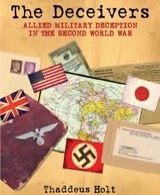The Deceivers: Allied Deception in 2nd World War – Book Review
 The Deceivers: Allied Military Deception in the Second World War. Thaddeus Holt. Skyhorse Publishing, Inc., 2007. 1148 pages. Paperback. $22.95.
The Deceivers: Allied Military Deception in the Second World War. Thaddeus Holt. Skyhorse Publishing, Inc., 2007. 1148 pages. Paperback. $22.95.
The most impressive aspect of The Deceivers is the incredible amount of research Holt conducted.
Having read numerous book reviews, I am always skeptical when I see the words "definitive account." Obviously, that is very high praise and is a significant challenge for any book to live (read) up to. Consequently, I have never used the words myself in a review. However, those words quickly came to mind after reading Thaddeus Holt’s superb book, The Deceivers: Allied Military Deception in the Second World War.
{default}Within the pages of The Deceivers, Holt details (a word which will come up in various forms in this review) the Allies’ use of strategic deception during World War II. In his discussion, he exhaustively covers all the major deception operations (and probably all the minor ones as well) conducted by the Allies. Within his study, he provides comprehensive profiles of the agents conducting the operations, analyzes the planning, preparation, and execution of the missions, and describes the ramifications the deception efforts had politically and militarily on both sides. Throughout the investigation, he stresses the lessons learned by the Allies in conducting strategic deception and the marked improvement the British and Americans attained in executing deception during the course of the War.
At well over 1,100 pages, The Deceivers is clearly not your proverbial quick read. In fact, its sheer size may intimate many potential readers and dissuade them from selecting Holt’s volume. However, The Deceivers’ bulk should not lead prospective readers to believe that the volume is a long, laborious read. On the contrary, the book is engaging throughout.
First, there is the subject matter itself. It seems there are few topics more interesting to military history enthusiasts than deception. The act of tricking or confusing an adversary simply has a way of grabbing and holding a reader’s attention. Holt capitalizes on this fascination within The Deceivers.
Second, as much as military history devotees are attracted to the acts of deception, they are even more engrossed by those executing the acts. Without question, we want to know all we can about those individuals who engage in the art and science of deception. Holt presents details on dozens of Allied agents. These details include backgrounds, careers, and their involvement in particular deception operations. This "personalization" of the volume will keep readers turning the pages (the many pages) of The Deceivers.
Finally, Holt has crafted a volume filled with dozens of vignettes focused on specific deception operations. These accounts interspersed throughout the book are certain to keep readers riveted. With a highly energetic and descriptive writing style, Holt displays a unique ability to tell a tale. There will certainly be times when readers will feel they are digesting an Ian Fleming (himself a British agent) or Alistair MacLean novel instead of reliving World War II history.
Unquestionably, the most impressive aspect of The Deceivers is the incredible amount of research Holt conducted in crafting his volume. The author spent well over a decade researching his book, and his efforts are clearly visible. He has taken advantage of newly declassified material and dozens of interviews to reveal information to readers that previously was unavailable. More importantly, he has been able to weave this research into meaningful discussion for the reader. As many of us have observed, many authors do not possess this critical skill.
Besides the previously addressed strengths of The Deceivers, I would be remiss if I did not point out two other benefits for readers. The first is a chapter Holt places early in the volume that provides a primer on deception. This outstanding introduction truly sets the conditions for the remainder of the book for readers of all knowledge levels. The other is Holt’s inclusion of highly interesting and informative appendices at the conclusion of the book, including an annotated listing of all Allied deception operations, an annotated listing of Allied agents, and a list of all the notional Allied units used in deception efforts.
The only noteworthy recommendation I would offer for improving the paperback edition of The Deceivers would be to add more photographs. Although Holt inserted nearly two dozen individual photos of agents discussed in the volume, that is insufficient for a book of this length. Additional pictures of other agents, and photographs related to specific deception operations, would have added appreciably to the book.
The Deceivers is not the optimal choice for those seeking a general book on Allied deception efforts in World War II. Its level of completeness will quickly overwhelm this category of reader. However, those desiring a high level of detail are sure to be satisfied with Holt’s labor of love. They will likely come to the same conclusion that I have: The Deceivers is— Dare I say?—the definitive book on the subject!
Rick Baillergeon is a retired U.S. Army Infantry officer. Since his retirement, he has served as a faculty member at the U.S. Army Command and General Staff College. He is also co-author of the popular ACG Web series "Tactics 101."


In my paperback edition of The Deceivers you read at page 148 that “the Twenty Committee included … C.T.D and … ”
Can you tell where C.T.D. stands for ?
Sincerely yours
wim